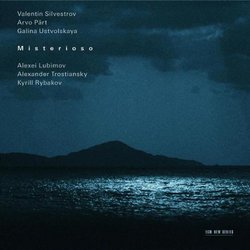Unique and Provocative
Jerome S. Shull | Prescott AZ | 02/17/2007
(4 out of 5 stars)
"A fine, sometimes stunning and haunting, performance which satisfies more after several listenings."
Works by three Soviet and post-Soviet composers whose music,
Christopher Culver | 11/08/2008
(3 out of 5 stars)
"This ECM disc, released in 2006, features chamber works by three composers from the former Soviet Union who wrote in an intensely personal style that yet remained informed by a tradition left behind by the international avant-garde. Kyrill Rybakov performs on clarinet, Alexander Trostiansky on violin and Alexei Lubimov on piano.
The Ukraine composer Valentin Silvestrov contributes two pieces. The first, "Post Scriptum" for violin and piano (1990) is typical of his late output. Meant as postludes to the Classical and Romantic transcriptions, works of this era are a fog of references to common-practice tonality, though undramatic and without any ultimate sense of closure. Lush melodies arise and fall in one voice, only to be picked up and carried forward for a bit by other voices at lower dynamic. Unfortunately, Silvestrov's music tends to suffer from excessive length. Sure, the first movement of "Post Scriptum" is lovely, but the second and third feel completely unnecessary, as if he's just milking it.
Silvestrov's "Misterioso" (1996) is a rather different work indeed, though it preserves his general feel for harmonies. The first mystery that we confront is that though it's scored for "clarinet solo", there's an obligatory piano part that the clarinest must also play. The piano incessantly sounds out loud chords, while the clarinet plays in response. As the work goes on, the clarinet's sound becomes increasingly wispy through extended techniques. This sort of work goes to show that Silvestrov's late period, for all its imperfections, is far from a simple retread of anything already accomplished. He's still making original explorations.
Arvo Part's "Spiegel im Spiegel" (Mirror in Mirror, 1978) is one of the Estonian composer's great works of "holy minimalism". Having been arranged for several pairs of instruments, it is present here in the version for clarinet and piano. In this extremely elegant piece, the piano keeps a constant cadence against which the string instrument sweeps. The result hints at something immensely spiritual, like seeing two lovers gaze into each other's eyes. Part was later to shake up this joining of loving voices with the faster-moving "Fratres" piece, arranged for a number of different instruments over the years, but this contemplative early effort has a beautiful clarity. Lubimov takes the piano part very fast here, and I must say I prefer the slower tempo of Sergej Bezrodny on the ECM Part disc ALINA.
If Silvestrov sounds like he's desparately trying to return to the Romantic tradition to avoid facing the fragmentation of modern music, Galina Ustvolskaya inherited the Romantic tradition and led a subdued rebellion against it. The "Trio for Clarinet, Violin and Piano" (1949) and the were the first works I've heard by the . In the Trio, careful interaction between the instruments in the first two movements gives way to mournful gushing by the violin in the last. The "Sonata for Violin and Piano" (1952) inhabits the world of Shostakovich's chamber music. All in all, I can't get into Ustvolskaya's music much. It reminds me of the generic Soviet early modernism that Gubaidulina, Schnittke and Part passed through before finding their original voices.
This disc will appeal to a certain demographic of modern classical listeners, probably those who already have the label's Part and Silvestrov works in their libraries."


 Track Listings (9) - Disc #1
Track Listings (9) - Disc #1